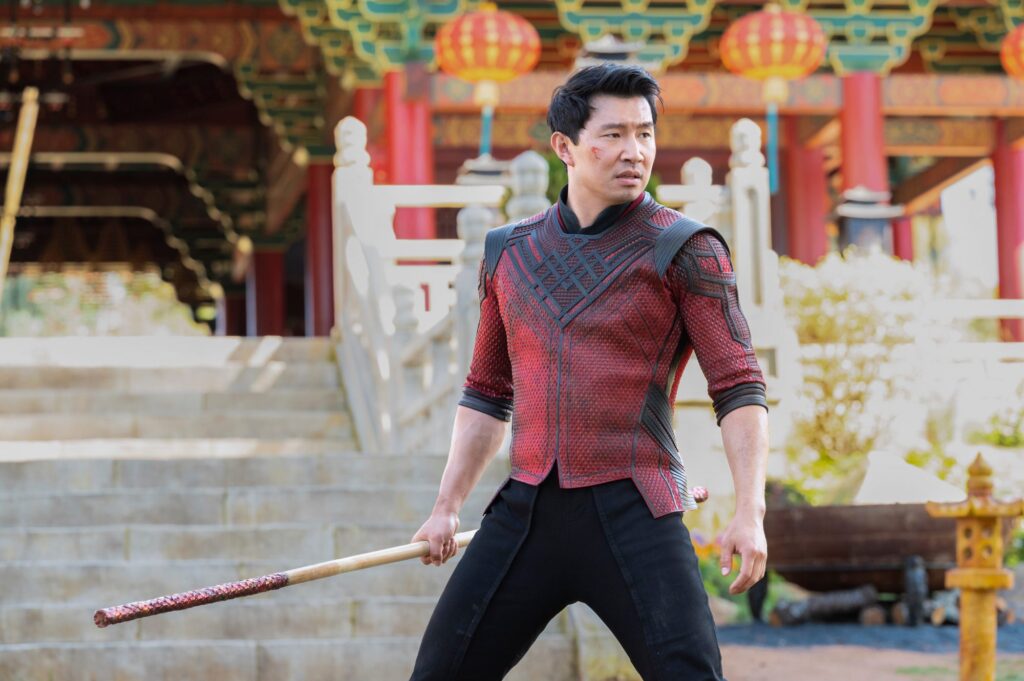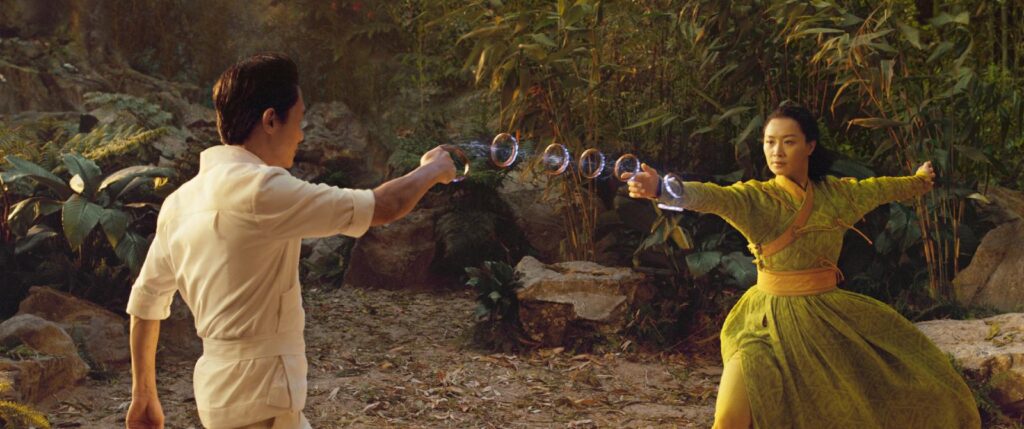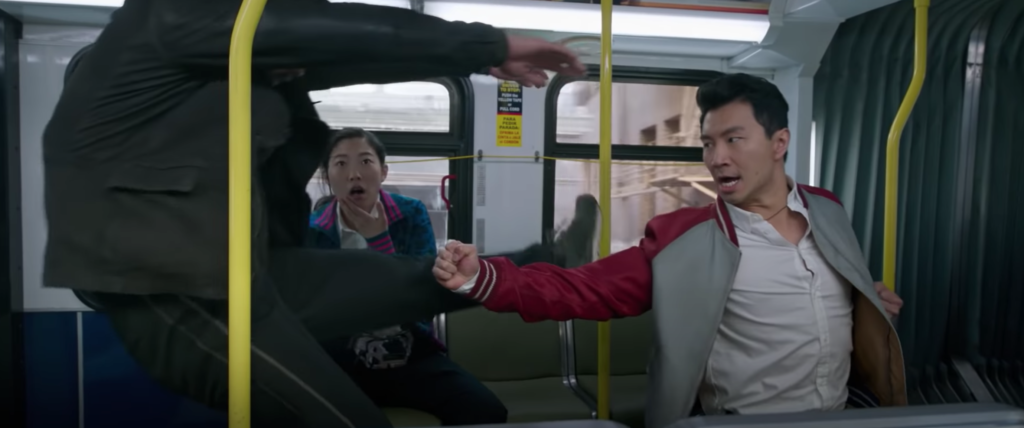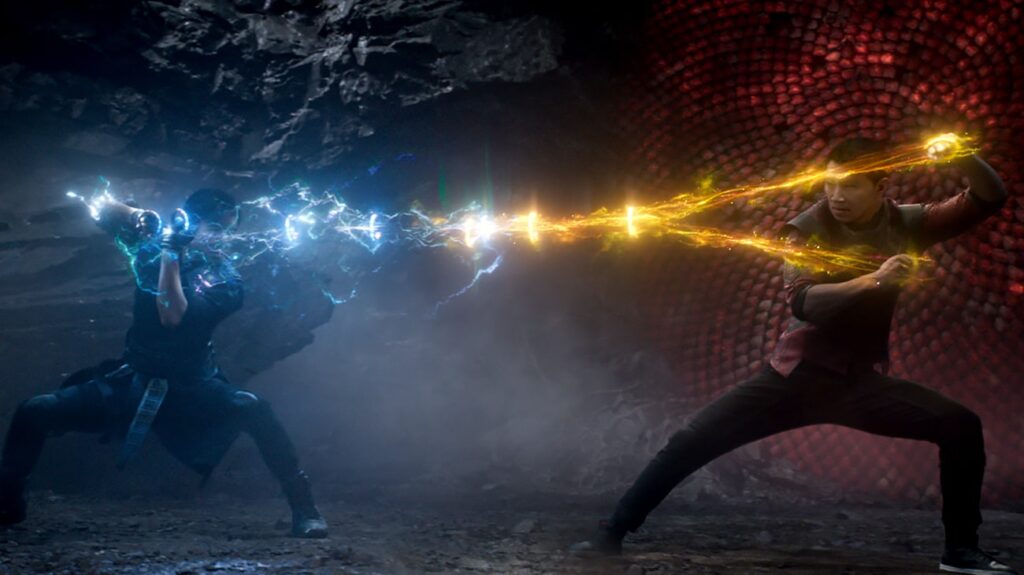
Shang-Chi and the Legend of the Ten Rings could have been a damn good comic-book movie, if only it hadn’t been about the Ten Rings. Neatly ornamented circlets that flash blue-and-purple lightning, these conjoined jewels vest their bearer with cosmic power, which is cool for him but unfortunate for us. I’m sure that blasting bolts of deadly energy from your wrists is an efficient method of laying waste to your enemies; visually speaking, it’s a drag, and so is this film’s prologue, which appears poised to squander the great Tony Leung—saddling him with lank hair and medieval armor, then watching as he magically vaults over and slices through an entire opposing army. He’s lord of the blings, and his growling invulnerability initially marks him as yet another tedious Marvel villain.
Happily, the Ten Rings factor little into Shang-Chi, at least until its predictably torpid climax. Even the tired prologue is something of a feint, seeing as how it’s followed by a second preamble, this one far more elegant. Flashing forward a thousand-odd years to 1996, it finds Leung’s heavy, Xu Wenwu, newly shorn and stumbling into a pastoral grove, where he trades balletic blows with his future wife, Ying Li (Fala Chen); their graceful combat, as much a dance as a fight, recalls the stylish wirework of Crouching Tiger, Hidden Dragon. And for most of its runtime, Shang-Chi aspires to that level of intimacy and fluidity, eschewing CGI pyrotechnics and globe-altering stakes in favor of taut action and clenched family drama.

This isn’t exactly new ground for the Marvel Cinematic Universe. Thematically, Shang-Chi braids together strands of Black Widow—the reinvented warrior seeking to atone for a troubling past—and Black Panther—the California-based scion returning to their homeland and encountering complex dynastic politics. Except, of course, that this is the first MCU picture featuring an Asian lead (Simu Liu) and made by an Asian director (Destin Daniel Cretton). In American blockbusters, advances in representation tend to be glacial and imperceptible (remember that blink-and-you’ll-miss-it gay cameo in Avengers: Endgame?), but Shang-Chi exhibits a welcome cultural focus that goes well beyond tokenism. Architecturally, with its angular temples and bamboo forests, it possesses a decidedly Eastern feel, while it seamlessly incorporates a number of creatures—long-tailed huli jing, majestic qilins—from Chinese mythology.
These dashes of ethnic flavor help add color to a narrative that is, in its bold strokes, rather familiar. When we first meet Shang-Chi (Liu), he’s a nondescript valet in San Francisco going by the name Shaun; he spends his dull days parking luxury cars for more successful Bay Area yuppies, and his frivolous nights crooning drunken karaoke with his coworker and best bud, Katy (Awkwafina). (Aside from a grandmother nosing about when these two conveniently single pals are going to get married, the film sidesteps the prospect of romance, an oddly refreshing move that’s also in keeping with the MCU’s overall spirit of sexlessness.) They’re both proud of their aimlessness, but Shaun is hiding a few secrets along with that emerald pendant he tucks beneath his T-shirt; he’s Wenwu’s son, and it isn’t long before he’s drawn back into the sinister world of palace intrigue he fled a decade ago.

To its credit, the script (by Cretton, Dave Callaham, and Andrew Lanham) doesn’t frame Wenwu as yet another megalomaniac in search of a galactically significant MacGuffin; instead, his motivations are personal. He’s convinced that Li remains alive (or that her soul has been restored, or something) and is being held captive in a secret realm, and he needs the help of Shang-Chi and his sister, Xialing (Meng’er Zhang), to locate it. It’s nice to watch an MCU movie that isn’t obsessed with fitting into the broader hierarchy (don’t worry, fanboys, there’s still the obligatory mid-credits scene featuring a few avengers, while another callback—this one involving a former Oscar winner—is honestly delightful), but Shang-Chi’s stabs at Shakespearean drama feel somewhat banal. One of the pleasures of Black Widow was that it examined the issue of nature versus nurture through the perspective of a surrogate family, exploring whether loyalty could transcend bloodlines. Here, Shang-Chi must instead tackle the standard burdens of lineage, and his daddy issues—whether he can reshape his ancestral legacy of domineering bloodlust or is doomed to perpetuate it—don’t carry much weight. Leung is a naturally fearsome presence, but Cretton keeps him on a leash, preventing him from exuding his full charisma, while Liu is plainly less comfortable wrestling with his character’s conscience than he is joshing and punching.
Which doesn’t mean he gives a bad performance. “Does he look like he can fight?” Katy asks rhetorically when Shaun suddenly finds himself in the middle of a brawl on a Muni bus. Actually he does, and not just because he sports the most sculpted abs in the history of parking attendants. Liu performed many of his own stunts, and most of the action sequences in Shang-Chi sing with a physical legitimacy that’s unusual for the CGI-heavy MCU. That bus fight, in which Shaun dispatches a dozen assailants before facing off against a glowering Bond-like baddie (Florian Munteanu) with a sword in place of an arm, is the movie’s best sequence, a chaotic whirlwind of thuds and kicks that’s also cleanly choreographed; a later scene, in which Shang-Chi and Katy try to escape from a Macanese high-rise by clambering across a scaffold (complete with a Skyfall-esque duel that’s shadowed by glowing pink icons), is nearly as impressive. Cretton has chosen his collaborators well: His cinematographer, William Pope, supplies the same smooth camerawork that he brought to the Matrix trilogy, while stunt coordinator Brad Allan (whose memory the picture is dedicated to) leans heavily on his past work with Jackie Chan, resulting in combat that’s playful and dynamic.

Ironically, it’s once Shang-Chi immerses itself even deeper into its Chinese roots that it hits the skids. The film’s final act unfolds in the mystical village of Ta Lo, a bucolic paradise where humans and beasts roam harmoniously, and whose leader is played by yet another legend of Asian cinema. (The perilous journey to this hidden fortress involves lethally shifting trees, panicky driving, and translated instructions from a faceless furball named Morris; it’s deeply silly.) It’s a beautiful place, but its delicate grandeur proves a poor fit for the cataclysmic mayhem that is contractually required to conclude every Marvel movie. Cretton is a capable and sensitive filmmaker (his best work remains Short Term 12), but despite deploying some clever color-coding (the blue-and-yellow flashes of luminescence occasionally recall Star Wars’ superior lightsaber battles), he struggles to operate on a large scale. The picture’s laborious finale—which returns those wretched Ten Rings to the fore, and which features giant dueling dragons exchanging weightless whacks that possess all the force of a plummeting feather—is worse than a bore; it’s a betrayal of the textured drama and hard-hitting action that came before.
It feels churlish to hold Shang-Chi’s third-act failures against it too harshly, even if they serve to degrade its otherwise distinctive personality. On the whole, the film isn’t as funny or vibrant as it might have been, but it still contains appealing moments of weirdness, as when Katy attempts to disorient a foe by belting out the lyrics to “Hotel California”. Yet while that’s a cute bit, it also functions as a subliminal reminder of the MCU’s greatest flaw. Rather than seeing things through to a rousing finish, these movies tend to check out any time they like.
Grade: B-
Jeremy Beck is the editor-in-chief of MovieManifesto. He watches more movies and television than he probably should.
